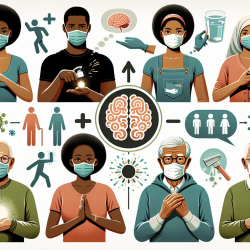Introduction: The Power of Social Cognition in Health Behavior
In the realm of health psychology, understanding and influencing human behavior is pivotal, especially during global health crises like the COVID-19 pandemic. The research article "Using an Integrated Social Cognition Model to Predict COVID-19 Preventive Behaviors" by Chung-Ying Lin et al. provides a comprehensive framework for understanding how social cognition can predict and enhance preventive health behaviors.
Key Findings: A Data-Driven Approach
The study utilized an integrated social cognition model to analyze COVID-19 preventive behaviors among the Iranian population. With a robust sample size of 1,718 participants, the research employed structural equation modeling to explore the relationships between social cognition constructs and preventive behaviors.
The findings highlighted two primary constructs with significant impact:
- Coping Planning (β = .575, p < .001): This refers to the strategies individuals use to manage potential barriers to behavior change.
- Action Planning (β = .267, p < .001): This involves creating detailed plans on how to execute the desired behavior.
These constructs were identified as critical predictors of COVID-19 preventive behaviors, such as handwashing and social distancing.
Practical Implications for Practitioners
For practitioners, especially those involved in online therapy services like TinyEYE, these findings offer actionable insights:
- Develop Interventions: Design interventions that focus on enhancing coping and action planning skills. For instance, guide children and their families in creating specific plans for maintaining hygiene and social distancing.
- Enhance Self-Efficacy: Encourage self-efficacy by providing positive reinforcement and practical strategies to overcome barriers, fostering a sense of control and confidence in executing preventive behaviors.
- Tailor Communication: Use data-driven insights to tailor communication strategies that resonate with the target audience's social and cognitive contexts.
Encouraging Further Research
While the study provides a solid foundation, further research is essential to explore the applicability of these findings across different cultural and demographic contexts. Practitioners are encouraged to engage in research that examines the long-term impact of targeting coping and action planning on preventive behaviors.
Conclusion: A Call to Action
By leveraging the power of social cognition, practitioners can significantly enhance the effectiveness of health interventions. As we continue to navigate the challenges posed by COVID-19, adopting a data-driven approach to behavioral change is crucial for creating positive health outcomes.
To read the original research paper, please follow this link: Using an integrated social cognition model to predict COVID-19 preventive behaviours.










